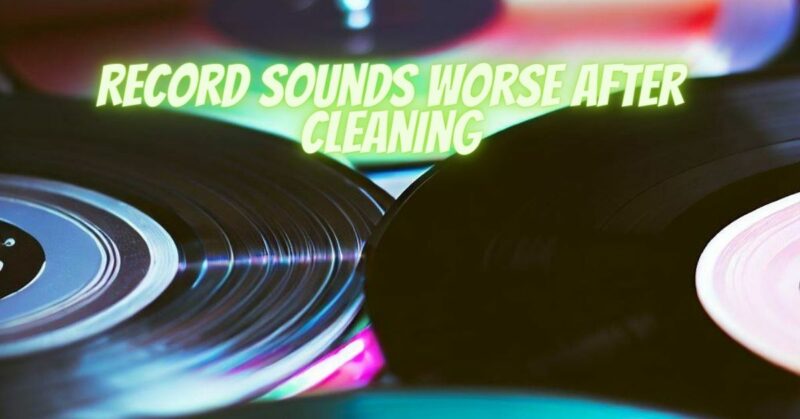Vinyl records, celebrated for their warm analog sound and nostalgic charm, sometimes perplex enthusiasts by sounding worse after undergoing cleaning efforts. While cleaning is generally expected to enhance playback quality, the occurrence of records sounding worse after cleaning can be disheartening. In this article, we delve into the factors that can contribute to this phenomenon, potential causes, and strategies to address and prevent these unintended outcomes.
The Promise of Cleaning: Cleaning vinyl records is an integral practice in preserving sound quality and prolonging the life of records. By removing dust, dirt, and contaminants from the grooves, cleaning aims to minimize surface noise and improve playback clarity. However, there are instances where cleaning appears to yield opposite results.
Potential Causes of Deterioration: Several factors can contribute to records sounding worse after cleaning:
- Ingrained Contaminants: Over time, contaminants can become ingrained in the grooves, making them challenging to remove completely through cleaning. This can result in persistent surface noise despite cleaning efforts.
- Residue from Cleaning Solutions: Improper use of cleaning solutions, especially those that leave behind a residue, can lead to worse playback quality. The residue may negatively interact with the stylus, impacting sound.
- Excessive Moisture: Overly wet cleaning methods or improper drying can introduce moisture into the grooves, leading to temporary or permanent deterioration in sound quality.
- Stylus Damage: Cleaning methods that involve brushing or manual cleaning can potentially damage the stylus, affecting its ability to track the grooves accurately.
Strategies to Address Deterioration:
- Inspection Before Cleaning: Carefully inspect records before cleaning to identify any visible issues, such as scratches or scuffs, that may contribute to deteriorated sound quality.
- Adjusting Cleaning Methods: If records sound worse after cleaning, experiment with different cleaning methods or solutions. Some records may respond better to specific techniques.
- Thorough Drying: After cleaning, ensure records are thoroughly dried before playback to prevent moisture-related issues that could lead to deterioration.
- Reevaluating Playback Equipment: Assess your turntable’s components, including the stylus, cartridge, and tonearm. Damaged or misaligned components can negatively impact sound quality.
- Professional Inspection: If deterioration persists, consider seeking professional inspection and cleaning services that employ advanced equipment and techniques.
Prevention for Future Cleaning:
- Choosing Appropriate Cleaning Solutions: Opt for cleaning solutions specifically designed for vinyl records to avoid potential residue issues.
- Gentle Cleaning Techniques: Employ gentle cleaning techniques, such as using carbon fiber brushes or record cleaning machines, to minimize the risk of stylus damage.
- Proper Handling: Handle records with clean hands and ensure a dust-free environment to reduce the accumulation of contaminants.
The occurrence of records sounding worse after cleaning can be disappointing, but understanding the potential causes and implementing appropriate strategies can help address and prevent these unintended outcomes. While cleaning remains an essential practice, achieving optimal results involves a balance of proper techniques, careful inspection, and adjustments based on individual records. By prioritizing the preservation of both sound quality and record integrity, enthusiasts can continue to enjoy the richness of analog music playback.


